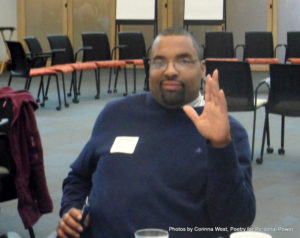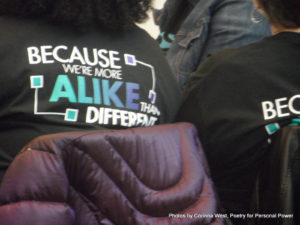Creating Community Solutions, part of the national mental health dialogue project, was started over four years ago to engage the public around mental health. It was based on a concept called deliberative democracy, where people who disagree with each other engage in dialogue to come to different solutions for a problem. However, for many reasons, this particular project only engaged with one part of the community. The chance to hear from the public was completely missed. Here is how that happened.
This critique will be a challenging read for people who have invested years of effort into this project. Remember we are not challenging your morals or your efforts. We think everyone in this process had the best hopes and intentions for the work. However, there were political, financial, structural, and community reasons that these efforts have been diluted. We are looking at some of these external forces that derailed the project, where people tried very hard to do a good job but external forces blocked their efforts.
The Public View of Mental Health is Different than the Mental Health Provider View
The public in general does not have a high view of mental health services and often does not want to be engaged in mental health projects. Evidence for this comes from many sources. Patients often quit medication because they believe it doesn’t work (75% according to the CATIE trial). Clients in California mental health centers average less than 1 appointment, meaning no shows vastly out-number regular appointment attenders. The Stigma Research Workshop in 2006 expressed concerns that the mental health professionals held pessimistic views that recovery was possible. A 2013 systematic review of help-seeking and stigma identified that the two largest barriers to individuals seeking help were “disclosure concerns,” or fear of mental health labels and “negative social judgments”. This is not an environment that is going to be successful in grabbing public attention and support.

Mental health services do have some benefits for some people if they are fully informed. So there is a need to get positive messages into the community to help lower the prejudice against mental health issues so that more people can get help when they need it. The first step in this is the language we use to talk about mental health. The public does not respond well to the language used by mental health professionals. In fact, John Read’s research finds that individuals are actually more kind to persons in distress when they believe problems are caused by a life situation instead of an biological illness. Since negative social judgments are a major barrier to a person seeking help, it is in everyone’s best interest to assist in eliminating that barrier by using language that encourages public support. This will likely require language that enables an empathic response to the sufferer and a sense of understanding. A disease/biological model generally doesn’t accomplish this.
Medical Harm Must be Acknowledged
Secondly, the treatment itself must actually be effective and service providers must be responsive to treatment that is not working. As stated above, many people simply quit their medications because they don’t experience much improvement from taking them. It has been widely established that anti-depressants simply do not work for many people, and may not even beat placebo. To make matters worse, the side effects from these medications often harm people. When people explain this to treatment provider they are often ignored or simply given more medications. Doctors do not, as a general rule, understand much about medication withdrawal effects and other harms created by mental health treatment. People who are harmed often simply drop out of care. The mental health system is filled with people who have self-selected for liking mental health care.
Yet the community is filled with a more even mix of people who liked and who didn’t like their care. Many people have found other ways to solve their problems, and few of those ever return to inform mental health providers. So mental health providers have a vastly skewed perception of what helps and doesn’t help people. This is called, “clinicians illusion,” where they see more disabled people and more people who liked services that the proportions that actually exist in the community. The public perception is very different. Many people in the community have heard stories from friends and relatives about not just benefit from “treatment,” but also harm from the existing mental health care paradigm and other ways of solving the concerns. Yet these stories do not generate a lot of media attention.

Ineffective treatment is hardly ever talked about in the public, which only adds to the distrust and disengagement between the public and the mental health professionals. It is understandable that mental health providers are often trying their best with limited knowledge, resources, and energy, but past failed attempts at treating illness creates distrust that must be bridged and acknowledged in order to be improved. Thomas Insel, the director of the National Institute of Mental Health, wrote a blog calling for “Atonement,” saying we must acknowledge these past harms to move forward.
Why only Advocates can Represent the Public
That trust is built through public advocates. Medical-harm aware advocates are educated about the limitations of mental health treatment. They know the problems to using the disease model and a medication focused approach. Fully informed people tend to be connected to the recovery movement, a national community of mental health civil rights workers who are aware-of and in-tune with the latest research and effective methods. We typically spend the majority of our efforts and resources engaging the community. We typically use different avenues and different methods to engage the public and therefore have a better chance at spreading new information and ideas to the public. We hear stories all the time from people who have graduated a need for mental health services. Often non-compliance with mental health providers is the first step to recovery. Our community knows how to help people safely come off psychiatric medications and walk away from mental health labels that may be doing more harm than good.
Unfortunately, the Creating Community solutions project did not engage our community.
- Trying to talk about mental health without including the recovery movement advocates is like trying to reduce racism without including African-Americans.
- This is like trying to reduce homophobia without invited the gender identity movement.
- This is like trying to promote active transportation without inviting bicyclists.
- This is like trying to do a discussion about civility in politics but then only inviting the Republicans.
How can we promote civic engagement about mental health without including a perspective held by many members of the community? The missing perspective is very different. Maybe mental health concerns were a life situation, not an illness. Maybe drugs and diagnoses might actually make this worse. Maybe expensive professionals – the current mental health “treatment” paradigm, is not the answer. So why were 35% of the attendees of the Creating Community Solutions dialogues identified as mental health providers? How is that community engagement?

This happened because the Creating Community solutions projects filled their steering committees with mental health professionals, and people who fund mental health professionals. There were advocates present, but they were mostly disease model advocates from NAMI who promote the diagnosing and drugging paradigm. Unfortunately the recovery movement does not have a big public profile in many cities. So even if mayors and deliberative democracy leaders wanted to invite mental health civil rights workers, they didn’t know how to find them.
Since most of the event marketing in each city was done by the steering committees, few recovery perspective viewpoints were strongly represented. Most lead cities tried to exclude mental health professionals by one technique or another to actually hear from the public. Yet in each of the lead cities over 35% of the dialogue event attendees were mental health professionals, despite the call for “public” engagement. This is because mental health professionals, and their funders simply don’t know a language for mental health that would have brought the public to the table for this topic.
The national discussion guide was almost entirely based on the disease model view of emotional distress, and recovery movement advocates were not invited to the writing process. The experts on deliberative democracy that were leading the process said, “This discussion guide was just handed to us. We would have developed this process quite a lot differently, to include more voices. Once this went national, there was some kind of mad push to get this done quickly instead of doing it the right way.”
Reactions of Advocates to the Creating Community Solutions Project
One of the government agencies leading the project, that signed off on the discussion guide, said, “We know the peer input wasn’t included, but we weren’t given a very big role in the document. We still have a lot of work to do.”
Independent mental health advocates like Paul Komarek in Cincinnati, who has created a community based solution to solve heroin addiction, chose not to join. Paul said,
“I decided that I could not buy the methodology, including its lack of resources for people who wanted to lead a local effort. In our city, there is an appearance of accountability for service delivery planning, but the people who run the system just count the resources they have left, and don’t seek public opinion. The public has justified fear of attacks by people with mental health problems, but no one in service systems will both validate the fears and suggest ways of helping that people might actually accept.”

This national discussion was called for by president Obama after several mass shooting events. However President Obama personally squelched an investigation into the link between mass shootings and SSRI anti-depressants. We are also not, as a community, discussing the research showing that help-seeking is blocked by the very help system that people are promoting. Michelle Obama has been championing the disease model of mental health care without, again, engaging with the advocates who have better solutions.
National Recovery movement advocates knew this intuitively when looking at the Creating Community Solutions process, and they stayed away. One of the national leaders on peer support said, “We looked in to it and at least around here pretty provider focused not very recovery focused..”
Another long term advocate from Virginia said, “There was not much effort to be inclusive of a wide range of people who use the system. This takes much more effort to organize. Hardly any meeting related to mental health is REALLY oriented to people who have disabilities and don’t drive.”
An advocate from Washington, D.C, said, “In DC the bottom line of the dialogue was only 2 things: Poverty and their view of stigma, which was defined as people not seeking care. Yes they are raising a lot of money to help push people into care. So here the dialogue is pushing toward screening and entrance of youth into the system.”
How this Created Problems with the Action Plans:
In other cities, the same pattern has emerged. Most action plans are focused toward recruiting people into the mental health system without considering if the “treatment” the mental health system in effective. Advocates have long pointed out data showing it may be doing more harm than good. Many cities are trying to address barriers to help-seeking without considering the research. The data shows that help seeking would be most likely improved by addressing disclosure concerns and offering education on filing discrimination complaints. Instead, most cities are focused on telling people more about the various diagnostic labels and why those labels are helpful.
Most of the lead cities include an action item around “reducing stigma.” However, their plans don’t address research showing that the two biggest sources of stigma are the mental health labels and the mental health professionals. Stigma-reduction, in general, is a flawed concept. This is explained by advocates, who point out that there is now way to address stigma until we de-medicalize help-seeking. Kevin Healy from Toronto, who leads a community for people who hear voices, says, “Stigma is spelled with a D and pronounced, ‘discrimination.’ “

Unfortunately, by ignoring Alternatives based advocates in this public discussion, we have lost the most powerful voices representing public opinion. Studies by John Read show that in a majority of countries, with a majority of survey methods, the public endorses a psychosocial explanation of mental health concerns instead of a disease model approach. This means what gets labeled as “mental health conditions,” is usually from a life event, not an Illness.
This means that marketing a “mental health dialogue,” indicates a basic assumption that things are “mental health conditions.” Therefore the basic assumption of all the marketing, labeling, and recruiting was in disagreement with core values of majority of the public.
A discussion on “mental health” (assuming emotional distress is an illness)
is like
A discussion about the “value of abortion alternatives” (assuming pro-choice is invalid)
A discussion about “stopping climate change” (assuming climate deniers are wrong)
An event about the “rudeness of Democrats” (assuming the problem is one sided)
So the basic principles and marketing of the disease based discussion was a strong turn off to anyone who does not accept this ideology. Also, the Frameworks Institute study on child mental health shows that the public does not generally view youth distress as an illness. Again, this makes it hard to recruit the public to a dialogue because then the problem has defined externally simply by only looking at the current solution. So now we know why leaders were scratching their heads about why the public stayed away, and why over 35% of event attendees were mental health professionals. The program bought into all of the assumptions of mental health professionals, we weren’t speaking the public’s language.
This lack of public engagement bears out when analyzing the results of the project. Most of the city’s action plans are simply re-shuffling resources from one part of the mental health system to another. Very few cities have moved resources into the community, or discovered new resources that already exist within their communities. This is what happens what the process is dominated by the status quo. We get status quo solutions. Next time a public dialogue on mental health is planned, let’s be
more creative
more community-oriented
and we’ll get more solutions.















Corinna,
I think we may underestimate just how very powerful the drug companies are and how they have infected the thinking, functioning, and funding/lifeblood of mental health professionals and organizations through this country. Most mental health professionals are much more interested in maintaining their income – which automatically means maintaining the myths about life problems being illnesses treating with drugs – than taking an honest look at what is really going on. Who would put themselves out there and be honest if it meant losing their job?
With middle class or upper-middle class people experiencing “mental health problems” – those suffering but with at least some financial resources and social support – I think the goal should be to never engage with the mental health system or if possible to extricate oneself from involvement with it as quickly as possible. The mental health system is like a dangerous cancerous organism that can severely wound and kill if one gets too close.
For lower class people, they’re often fucked by the lack of resources. It’s a terrible tragedy that if they look for help or get into trouble and get forced into “treatment”, they are met by the idiocy of the “I will diagnose your life problems as a brain illness and you have to take drugs” approach.
Although I hope I’m wrong, I expect that the next approach at dialogue will be quite similar to this one.
One of the most important steps to take would be to prevent drug companies from advertising directly to doctors and the public, as in all other countries except New Zealand. At least some people like Bernie Sanders are supporting this. I think we should support and call for this initiative. This would change professional and public opinions if less people were being bombarded by misinformation about drugs.
Report comment
The problem is that this entire discussion has been dominated by ideology.
Violent crime here is seen as a “mental health” issue. Every mental patient (mental health consumer, whatever) is guilty by association. Every person who has not been caught up on the receiving end of the “mental health” system is innocent by association.
Was there ever a more pointed instance of the insanity defense hurting more people than it helps? Here the distinction between criminal behavior and medical emergency is moot because the line between the two has become completely blurred. The criteria for hospitalization (sic) is perceived as a potential for crime. Growth in the “mental illness” industry is driven by this fear on behalf of the general public of violence from crazy people. It, in fact, serves as the basis for many ongoing human rights violations (i.e. treating human beings as less than human). To turn this matter around, I imagine it needs to be addressed, and in as direct a manner as possible.
Report comment